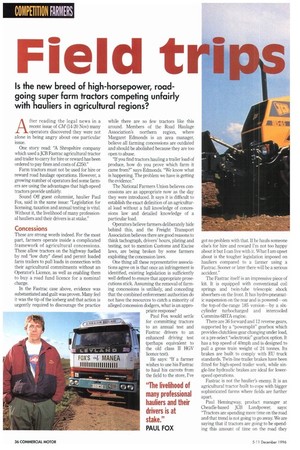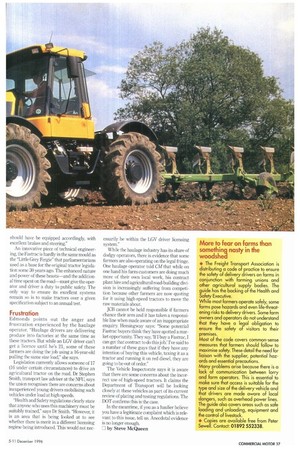Fie d t
Page 38

Page 39

If you've noticed an error in this article please click here to report it so we can fix it.
Is the new breed of high-horsepower, roadgoing super farm tractors competing unfairly with hauliers in agricultural regions?
After reading the legal news in a recent issue of CM (14-20 Nov) many operators discovered they were not alone in being angry about one particular issue.
One story read: "A Shropshire company which used a JCB Fastrac agricultural tractor and trailer to carry for hire or reward has been ordered to pay fines and costs of £250."
Farm tractors must not be used for hire or reward road haulage operations. However, a growing number of operators feel some farmers are using the advantages that high-speed tractors provide unfairly.
Sound Off guest columnist, haulier Paul Fox, said in the same issue: "Legislation for licensing, taxation and annual testing is vital. Without it, the livelihood of many professional hauliers and their drivers is at stake."
Concessions These are strong words indeed. For the most part, farmers operate inside a complicated framework of agricultural concessions. These allow tractors on the highway fuelled by red "low duty" diesel and permit loaded farm trailers to pull loads in connection with their agricultural commitments without an Operator's Licence, as well as enabling them to buy a road fund licence for a nominal charge.
In the Fastrac case above, evidence was substantiated and guilt was proven. Many feel it was the tip of the iceberg and that action is urgently required to discourage the practice while there are so few tractors like this around. Members of the Road Haulage Association's northern region, where Margaret Edmonds is an area manager, believe all farming concessions are outdated and should be abolished because they are too open to abuse.
"If you find tractors hauling a trailer load of produce, how do you prove which farm it came from?" says Edmonds. "We know what is happening. The problem we have is getting the evidence."
The National Farmers Union believes concessions are as appropriate now as the day they were introduced, It says it is difficult to establish the exact definition of an agricultural load without a full knowledge of concessions law and detailed knowledge of a particular load.
Operators believe farmers deliberately hide behind this, and the Freight Transport Association believes there are good reasons to think tachograph, drivers' hours, plating and testing, not to mention Customs and Excise laws, are being broken by some farmers exploiting the concession laws.
One thing all these representative associations agree on is that once an infringement is identified, existing legislation is sufficiently well defined to ensure that appropriate prosecutions stick. Assuming the removal of farming concessions is unlikely, and conceding that the combined enforcement authorities do not have the resources to catch a minority of alleged concession dodgers, what is an appropriate response?
Paul Fox would settle for committing tractors to an annual test and Fastrac drivers to an enhanced driving test (perhaps equivalent to the old class II HGV licence test).
He says: "If a farmer wishes to use his Fastrac to haul his carrots from the field to the store, I've got no problem with that. If he hauls someone else's for hire and reward I'm not too happy about it but I can live with it. What Jam upset about is the tougher legislation imposed on hauliers compared to a farmer using a Fastrac. Sooner or later there will be a serious accident."
The Fastrac itself is an impressive piece of kit. It is equipped with conventional coil springs and twin-tube telescopic shock absorbers on the front. It has hydro-pneumatic suspension on the rear and is powered—on
the top-of-the-range 185 version by a sixcylinder turbocharged and intercooled Cummins 6BTA engine.
There are 36 forward and 12 reverse gears, supported by a "powersplit" gearbox which provides clutchless gear changing under load, or a pre-select "selectronic" gearbox option. It has a top speed of 40mph and is designed to pull a gross train weight of 24 tonnes, Its brakes are built to comply with EU truck standards. Twin-line trailer brakes have been fitted for high-speed trailer work, while single-line hydraulic brakes are ideal for lowerspeed operations.
Fastrac is not the haulier's enemy. It is an agricultural tractor built to cope with bigger sophisticated farms where fields are further apart.
Paul Hemingway, product manager at Cheadle-based JCB Landpower, says: "Tractors are spending more time on the road and that trend is not going to go away. We are saying that if tractors are going to be spending this amount of time on the road they should have be equipped accordingly, with excellent brakes and steering."
An innovative piece of technical engineering, the Fastrac is hardly in the same mould as the "Little Grey Fergie" that parliamentarians used as a base for the original tractor legislation some 30 years ago. The enhanced nature and power of these beasts—and the additional time spent on the road—must give the operator and driver a duty to public safety. The only way to ensure its excellent systems remain so is to make tractors over a given specification subject to an annual test.
Frustration
Edmonds points out the anger and frustration experienced by the haulage operator. "Haulage drivers are delivering produce into factories at the same time as these tractors. But while an WV driver can't get a licence until he's 21, some of these farmers are doing the job using a 16-year-old pulling the same size load," she says.
Legislation currently allows someone of 17 (16 under certain circumstances) to drive an agricultural tractor on the road. Dr Stephen Smith, transport law adviser at the NFU, says the union recognises there are concerns about inexperienced young drivers mobilising such vehicles under load at high speeds.
"Health and Safety regulations clearly state that anyone who uses this machinery must be suitably trained," says Dr Smith. "However, it is an area that is being looked at to see whether there is merit in a different licensing regime being introduced. This would not nec
essarily be within the WV driver licensing system."
While the haulage industry has its share of dodgy operators, there is evidence that some farmers are also operating on the legal fringe. One haulage operator told CM that while on one hand his farm customers are doing much more of their own local work, his contract plant hire and agricultural road-building division is increasingly suffering from competition because other farmers are now quoting for it using high-speed tractors to move the raw materials about.
JCB cannot be held responsible if farmers chance their arm and it has taken a responsible line when made aware of an inappropriate enquiry. Hemingway says: "Some potential Fastrac buyers think they have spotted a market opportunity. They say, If I buy a Fastrac, I can get that contract to do this job.' I've said to a number of these guys that if they have any intention of buying this vehicle, taxing it as a tractor and running it on red diesel, they are going to be out of order."
The Vehicle Inspectorate says it is aware that there are some concerns about the incorrect use of high-speed tractors. It claims the Department of Transport will be looking closely at these vehicles as part of its current review of plating and testing regulations. The DOT confirms this is the case.
In the meantime, if you as a haulier believe you have a legitimate complaint which is relevant to this issue, tell us. Anecdotal evidence is no longer enough.
El by Steve McQueen








































































































